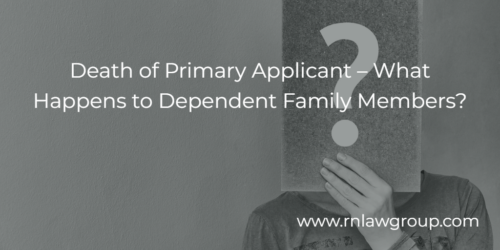
Death of Primary Applicant – What Happens to Dependent Family Members?
With the recent retrogression of the cutoff dates for EB-2 and EB-3 India, many waiting in the backlog are seeing no light at the end of the tunnel. The CATO Institute estimates that there are 1.4 million employment-based cases waiting for permanent residence. In 2018, CATO estimated that the wait for Indian immigrants with advanced degrees is 150 years https://www.cato.org/blog/150-year-wait-indian-immigrants-advanced-degrees With these long wait times, what would happen if the sponsored worker were to pass away?
In the past, a petition could not be approved if the petitioner died while the petition remained pending. In 2009, Congress addressed this scenario with a new statutory provision, INA 204(l). This provision gave noncitizens the ability to seek an immigration benefit through a deceased qualifying relative in certain circumstances.
For example, an H-1B worker is in the United States with an H-4 spouse and child. The H-1B worker is the beneficiary of an approved labor certification and I-140 petition. The priority date of the petition became current in October 2020 under the filing date chart. The family filed Adjustment of Status applications that remain pending due to retrogression. The H-1B worker is the primary applicant for the adjustment of status and the H-4 spouse and child are derivative applicants. If the primary applicant were to pass away before the adjustment of status can be approved, INA 204(l) provides relief to the pending derivative applicants. Because the spouse and child are derivative beneficiaries of the approved I-140 petition, their adjustment of status applications can continue to be processed as long as the spouse and child resided in the United States when the H-1B worker died and the spouse and child continue to reside in the US on the date of the decision on the pending application.
As long as any one surviving beneficiary of a covered petition meets the residence requirement, then the petition may be approved despite the death of the qualifying relative. All the beneficiaries may immigrate to the same extent that would have been permitted if the qualifying relative had not died. It is not necessary for each beneficiary to meet the residence requirements in order to remain eligible to adjust. Note that all applicants must continue to meet all of the normal adjustment of status requirements.
There is no form or fee to ask for section 204(l) relief. The surviving family members need to make a written request with supporting evidence of eligibility to USCIS. USCIS should be notified of the death before USCIS adjudicates the adjustment application. The written request should be sent to the USCIS office where the I-485 application is pending.
The request should specifically ask USCIS “to reinstate the approval of the petition under section 204(l)” and should include:
Name, deceased relative’s name, and the names of any other beneficiaries on the same petition;
Alien registration number (A number);
Deceased relative’s A number;
The A number for any other beneficiaries;
The receipt number on your petition or application;
The relative’s death certificate (a certified translation is required, if not in English);
Proof of residence (examples include, but are not limited to: lease/mortgage, utility bills, pay stubs, school records, etc.) at the time of the relative’s death up until the time of making the request.
But what if the priority date has never been current such that no I-485 application to adjust status has been filed?
In that situation, the approved I-140 petition can still be reinstated under section 204(l). But, in order for the surviving spouse and child to be eligible to file the adjustment of status based on this petition when the priority date becomes current, they need to be continuing to maintain their nonimmigrant status. The H-4 spouse would need to change status to another visa category and the child would need to become a dependent of the surviving spouse’s status. The spouse and child could then seek adjustment of status as if the qualifying relative had not died. The written request for section 204(l) relief should be included with the I-485 application package.
What if the I-140 had not yet been approved at the time of the H-1B worker’s death?
An officer may approve a pending I-140 petition if all other requirements of the I-140 petition have been met in order to allow the derivative beneficiaries the opportunity to apply for adjustment of status. The requirements for section 204(l) relief are the same, regardless of whether the petition was pending or approved when the relative died. As above, in order for the surviving spouse and child to be eligible to file the adjustment of status based on this petition when the priority date becomes current, they need to be continuing to maintain their own nonimmigrant status. The information needed to process the request is the same. The written request for section 204(l) relief should be sent to the USCIS office that approved the I-140 petition.
It should also be noted that INA 204(l) relief is discretionary. USCIS may deny a petition or application that may be approved despite the qualifying relative’s death if USCIS finds, as a matter of discretion, that approval would not be in the public interest. Before denying a visa petition or adjustment application as a matter of discretion on the ground that approval would not be in the public interest, an officer must consult with the appropriate USCIS headquarters office or directorate through appropriate channels.
By: Emily Neumann
Emily Neumann is Managing Partner at Reddy Neumann Brown PC with over 15 years of experience practicing US immigration law providing services to U.S. businesses and multinational corporations. Emily has helped transform the firm from a solo practice to Houston’s largest immigration law firm focused exclusively on U.S. employment-based immigration. She received her Bachelor’s degree in Biology from Central Michigan University and her Juris Doctorate degree from the University of Houston Law Center. Emily has been quoted in Bloomberg Law, U.S. News & World Report, Inside Higher Ed, and The Times of India on various hot topics in immigration. She is a member of the American Immigration Lawyers Association and Society for Human Resource Management.

